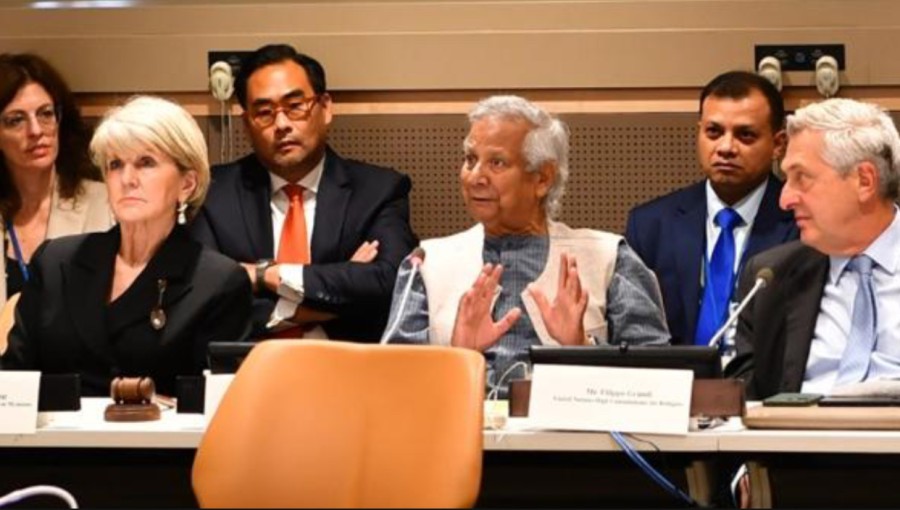New York, Sep 24 (V7N) - In light of the severe oppression faced by the military junta, Chief Adviser Professor Muhammad Yunus of Bangladesh’s interim government has put forth three key proposals aimed at facilitating the repatriation of the Rohingya population that has fled Myanmar for safety in Bangladesh. Yunus made these proposals during a high-level meeting on the Rohingya crisis, which he held on the first day of the 79th UN General Assembly. This meeting highlights the priority that Yunus is giving to the Rohingya issue amid his various activities at the United Nations. The meeting took place on Tuesday at 3 PM local time in New York.
The side event of the General Assembly was co-hosted by Indonesia, Gambia, Turkey, the United Kingdom, the United States, and the European Union. In his keynote address, Yunus outlined three proposals:
- He urged the UN Secretary-General to convene a conference involving all stakeholders to promptly address the Rohingya crisis. This conference would evaluate the overall situation and identify innovative and proactive solutions.
- He called for an acceleration of the 'Joint Response Plan' between the UN and Bangladesh, which aims to provide comprehensive support to the Rohingya community.
- Yunus stressed the importance of international community support for prosecuting and holding accountable those responsible for crimes against the Rohingya, including acts of genocide.
During the meeting, Yunus also highlighted the significant burden that the Rohingya crisis places on Bangladesh. He noted that the country has taken in approximately 1.2 million Rohingya refugees, and that around 32,000 newborns are added to the population annually. In the past two months alone, 20,000 new refugees have entered Bangladesh. While it is crucial to provide empathy and support for these refugees, Yunus emphasized that the crisis poses serious social, economic, and environmental challenges for Bangladesh, contributing to both traditional and non-traditional security risks. He pointed out that the Rohingya crisis has hindered Bangladesh's own development goals, pushing the country to its limits.
Yunus further remarked that despite numerous initiatives by various UN bodies, including multiple General Assemblies and the Human Rights Council, no substantial progress has been made toward the safe and dignified repatriation of the Rohingya people due to the unresolved fundamental issues in Myanmar. He noted that in the last seven years, not a single Rohingya has been able to return to their homeland. The increasing number of youth in the Rohingya refugee camps adds a new layer of security concerns.
He concluded by reaffirming Bangladesh’s commitment to working collaboratively with all stakeholders to ensure the rights, dignity, and safety of the Rohingya refugees, ending his address with a call for political solutions to resolve the ongoing crisis.
END/NYC/SMA/































Comment: